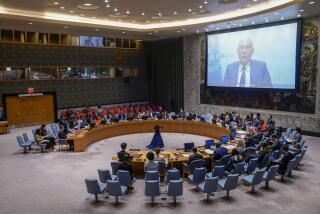No breakthrough in talks on N. Korea’s nuclear program
- Share via
BEIJING — In what probably was the Bush administration’s last chance to seal a deal with North Korea, talks in Beijing ground to a deadlock Thursday without agreement on how to verify Pyongyang’s promises to denuclearize.
The lack of an accord leaves in President-elect Barack Obama’s “in box” the same dilemma that faced President Bush, and before him, President Clinton: how to get a bankrupt dictatorship to give up nuclear weapons.
White House Press Secretary Dana Perino warned that the administration might take back some of the incentives that had been offered North Korea for its cooperation. Earlier this year, Bush removed Pyongyang from a blacklist of “terror sponsoring” nations. North Korea is also receiving fuel oil and other energy assistance.
At the session held over the last four days in Beijing, North Korea showed no willingness to accept proposals made by the United States, China, Japan, South Korea and Russia on how inspections would be conducted.
“There was a lot of agreement among a majority of the delegations there, but ultimately [North Korea] was not ready,” Assistant Secretary of State Christopher Hill said Thursday as he prepared to leave Beijing empty-handed.
In the summer, there was a flurry of optimism that a deal could be completed in time for Bush to consider it a part of his legacy, ridding the world of some weapons of mass destruction. North Korea fulfilled a promise to deliver a detailed inventory of its nuclear program and, as a show of faith, staged a televised demolition of a reactor’s cooling tower.
But the government in Pyongyang, the North Korean capital, has balked at the next step: agreeing to a verification protocol that would specify how international nuclear inspections would be carried out, what equipment inspectors could bring and what samples they could take out.
Scott Snyder, a Washington-based expert in North Korean negotiating behavior, said the regime’s failure to seal the deal would put it on a bad footing with the Obama administration.
“There would have been a clean path for the Obama administration to open a new page in the relationship with a North Korea committed to denuclearization,” Snyder said. “If the new administration has to pick up the pieces of what they felt would be completed already, there will be a cost in terms of energy and optimism.”
The hope had been that North Korea’s denuclearization could lead to the normalization of diplomatic relations, ending a state of hostility that dates to the beginning of the Korean War in 1950.
According to people familiar with the talks, North Korean negotiators were most uncompromising on equipment that inspectors could bring into the country and whether they would be able to take out samples for testing. Samples are needed to determine how much plutonium the country has produced to make sure nothing is stashed away without being declared.
Although the negotiators initially agreed to sampling, they refused to put it in writing, Hill said.
He said that such procedures were part of the “tried and tested ways of conducting verification.”
North Korea is in the midst of a growing food crisis and faces an uncertain future. Leader Kim Jong Il is believed to have suffered a stroke this summer, though the government denies it.
A Paris neurosurgeon who visited Pyongyang in October told the newspaper Le Figaro that Kim did have a stroke but is improving. Francois-Xavier Roux’s comment is the first public account of Kim’s illness.
Analysts believe that the lack of decisive leadership in Pyongyang, combined with Bush’s lame-duck status, doomed this latest round of talks from the outset.
“The North Koreans have always been uneasy with transitions in a democracy,” said Donald Gregg, a former ambassador to South Korea who meets often with the North Koreans. Kim’s ill health, he added, “has put a blanket over creative thinking in North Korea.”
As far as North Korea is concerned, most of Bush’s early presidency was spent dismantling a previous denuclearization agreement made by the Clinton administration. In that time, Pyongyang cranked up its mothballed nuclear program and in 2006 tested a small nuclear weapon.
Eventually, Bush administration hard-liners, led by Vice President Dick Cheney, lost out and U.S. negotiators started energetic efforts to reach a deal with North Korea.
--
More to Read
Sign up for Essential California
The most important California stories and recommendations in your inbox every morning.
You may occasionally receive promotional content from the Los Angeles Times.










